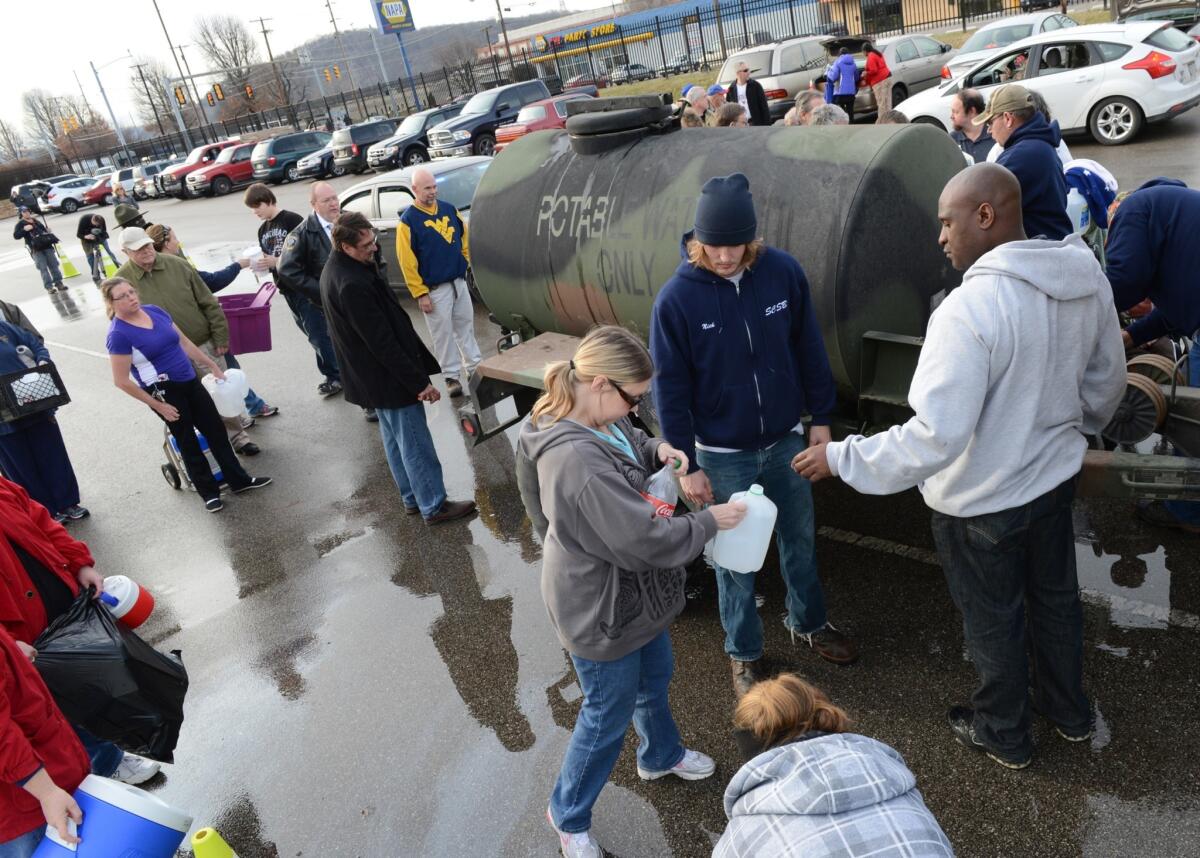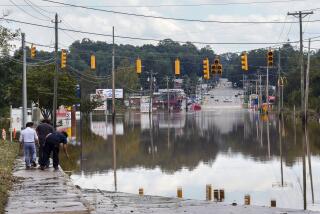Crippling West Virginia chemical spill leaves Charleston dry, quiet

CHARLESTON, W.Va. -- Downtown Charleston, normally packed with Friday night customers at restaurants and bars, was dark and quiet Friday evening. The local health department had ordered restaurants and other businesses to close as a faint chemical odor lingered on the streets. Residents were warned not to drink, cook with or bathe with tap water.
Hundreds of thousands of West Virginia residents have no idea when they will again be able to trust their water supply after a chemical used in the processing of coal spilled into the Elk River on Thursday morning. Once in the river, it flowed into a water treatment facility, about 1.5 miles away, where officials worried it could have polluted the water eventually sent to about 300,000 residents.
Even as state and federal agencies rushed emergency water supplies to the nine stricken counties, officials were promising to investigate how the chemical, 4-methylcyclohexane methanol, spilled. Gov. Earl Ray Tomblin said Friday that officials did not yet know how long the restriction would be in place. No injuries have been reported from the chemical, which can be harmful if ingested.
But the water emergency was taking a toll on the capital city of Charleston.
One major hotel closed because staff was unable to clean rooms without running water. The Holiday Inn on 2nd Avenue remained open, but reservationist Miranda Burkamer and other employees spent the day phoning customers to warn them that the hotel’s water and ice was unusable and the restaurant was closed. Almost 70 guests canceled, Burkamer said.
In the parking lot of a former industrial plant on Charleston’s western edge, emergency officials were distributing water from a tanker towed by a dump truck. A long line of residents toting buckets, pitchers and empty water and Gatorade bottles lined up in the dark, waiting up to an hour to fill up from the tanker’s spigots.
Under the blue glare of police lights, troopers kept the lines orderly as people bent over one at a time to fill their containers. At one point, the tanker ran dry and residents had to wait another 30 to 45 minutes for it to be refilled several miles away.
As they waited in line, people complained about a lack of personal hygiene -- and the fact that they had to use precious bottled water to wash faces, brush teeth and wash dishes.
“I haven’t had a shower in two days,’’ Dave Bays, 42, announced to the gathering as he waited in line, holding two new black plastic oil containers he said he had bought from an auto parts store because all ordinary water containers had sold out across the city.
“Nobody here has had a shower,’’ Bill Judy, 58, a state government worker, said with a laugh. Judy had bought four plastic bowls with lids, which he hoped would hold enough water to get him through another day.
Asked how he’d been faring at home with no potable water, Judy replied, “Peanut butter and jelly sandwiches and plenty of Gatorade.’’
Hayward Tryee, 48, a street department worker, came equipped with two big plastic jugs and two small plastic bottles. He had made it through the day Thursday with bottled water he happened to have on hand, but he ran out Friday afternoon.
“And the worst part is, we don’t know how long this is going to last. It could be a while,’’ he said.
Most stores in the area ran out of bottled water and containers by Thursday evening as desperate customers quickly cleared shelves. By the time Danny Tucker, 37, got off work late Thursday in Sissonville, outside Charleston, his local Kmart was out of water. So was every convenience store he checked.
So Tucker waited in the dark parking lot, slowly inching forward to the tanker taps. He carried four plastic jugs -- enough, once filled with water, to last at least a day at home, he said.
Mike and Judy Stone got lucky. The lines stretched across the parking lot when they arrived in their pickup truck, a new plastic cooler in the back. Mike, 65, stopped to help a woman lift a heavy tank of water she had filled. She was so thankful that she poured some of her water into the Stones’ cooler, filling it.
Stone hoisted the cooler into the pickup, next to a rain barrel he had just bought.
“Supposed to rain tomorrow,’’ he said. “That’ll help.’’
Charleston Mayor Danny Jones said about 40,000 miles of water lines would have be flushed to clear the chemicals from the water supply. He said he could not estimate how long it would take before water company customers could safely use their tap water.
“This has just been a disaster,’’ Jones told West Virginia Public Radio late Friday. “It’s crippled this community.’’
Asked how he personally planned to cope with no running water at home, the mayor replied, “I’ll stay close to my children and hope this thing ends soon.’’
ALSO:
U.S. Supreme Court takes up fight over TV streaming
Crowds rally at Utah capital in support of same-sex marriage
Insane Clown Posse sues Justice Department over gang designation
More to Read
Sign up for Essential California
The most important California stories and recommendations in your inbox every morning.
You may occasionally receive promotional content from the Los Angeles Times.











